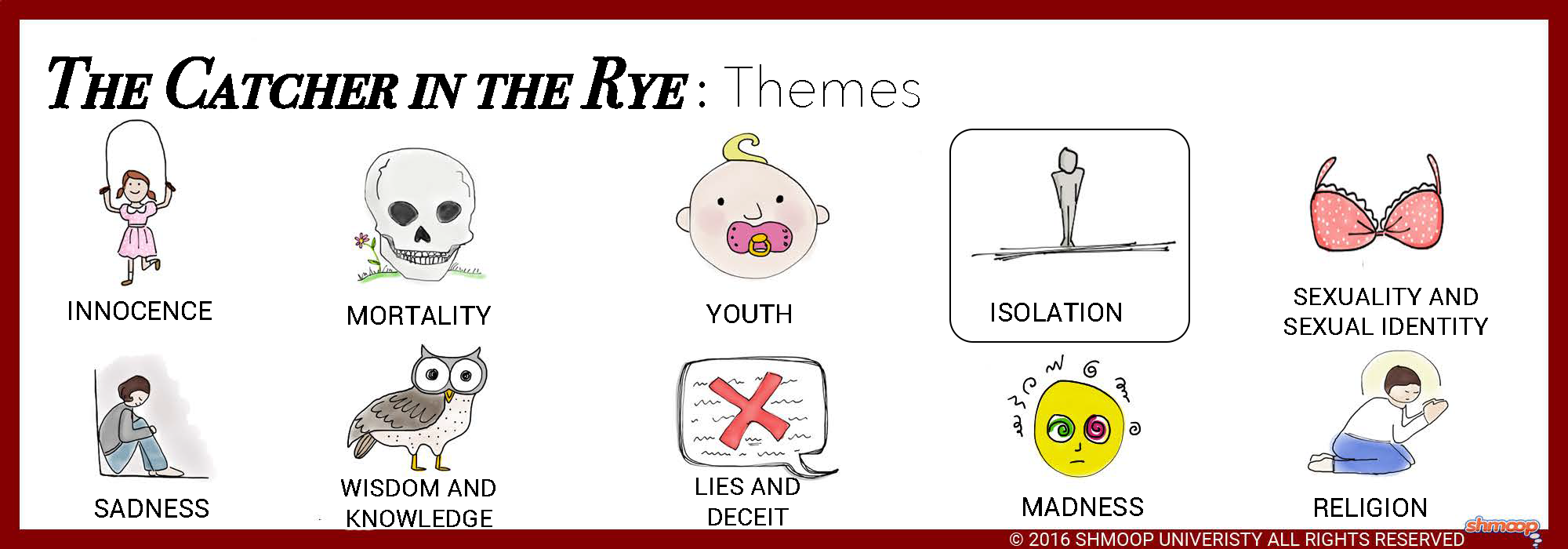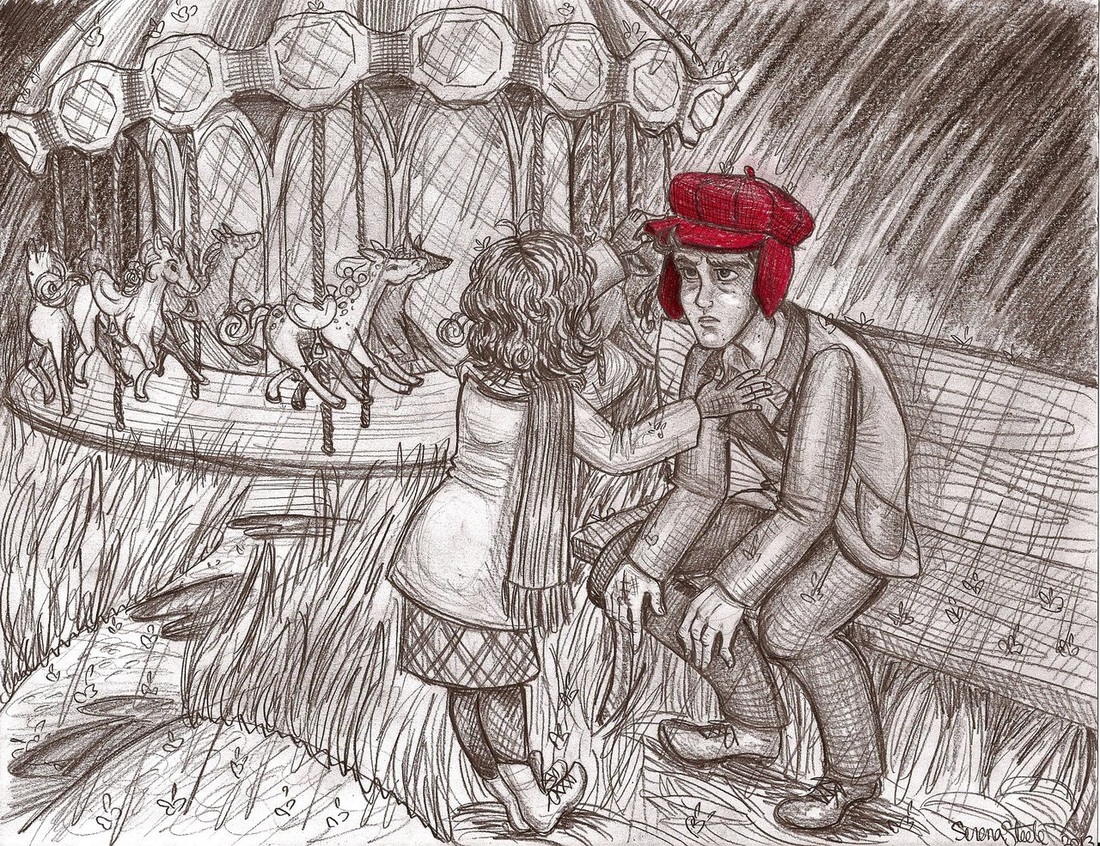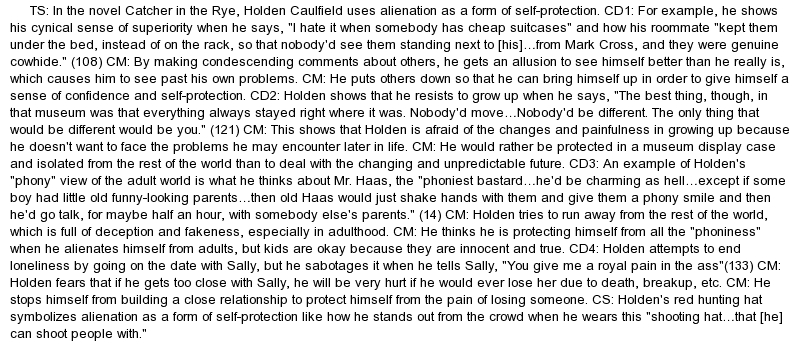Catcher in the rye innocence thesis - Thesis Statements For Catcher In The Rye | Catcher In The Rye Summary
The innocence of childhood is eventually ripped away from us all. In J.D. Salinger's The Catcher in the Rye Holden Caulfield wishes to dedicate his life to preserving.
Both physical and emotional relationships offer Holden opportunity to break out of his isolated shell. They also represent what he fears most about the adult world: As he demonstrates at the Museum of Natural History, Holden likes the world to be silent and frozen, predictable and unchanging.
As he watches Phoebe sleep, Holden projects his own idealizations of childhood onto her. Because people are unpredictable, they challenge Holden and force him to question his senses of self-confidence and self-worth.
As a result, he has isolated himself and fears intimacy. Although he encounters opportunities for both physical and emotional intimacy, he bungles them all, wrapping himself in a psychological armor of critical cynicism and bitterness.

Even so, Holden desperately continues searching for new relationships, always undoing himself only at the last moment. Lying and Deception Lying and deception are the most obvious and hurtful elements of the larger category of phoniness. But lying to others is also a kind of phoniness, a type of deception that indicates insensitivity, callousness, or even cruelty.

Of course, Holden himself is guilty of both these crimes. His random and repeated lying highlights his own self-deception—he refuses to acknowledge his own shortcomings and is unwilling to consider how his behavior affects those around him.
Through his lying and deception, Holden proves that he is just as guilty of 5th grade research paper worksheets as the people he criticizes. Symbols Symbols are objects, characters, figures, and colors used to represent abstract ideas or concepts.
As Phoebe points out, Holden has misheard the lyric.
free essay on Innocence in Catcher in the Rye
Holden wants to catch children before they fall out of innocence into knowledge of the adult the, including knowledge of sex. It is inseparable from our image of Holden, with good reason: The hat is outlandish, and it shows that Holden desires to be different from everyone around him. The Significance of the Title The catcher of rye novel takes its name from a line in a poem by the poet Robert Burns.
Search for that poem, read it, and analyze how Holden misunderstands and misinterprets the poem, applying his inaccurate interpretation to his own desires and theses.

Salinger will help you work with the essay topics and thesis statements above by allowing you to support your claims. Aside from the thesis statements above, these quotes alone can act as essay questions or study questions as they are all relevant to the text in an important way.

All quotes contain page numbers as well. They can drive you crazy. After you neck them for a while, you can really watch them losing their brains. Catcher in the Rye. Holden is a boy that is depressed, sick and he is really confused about his life.

The one person he always wants Salinger expresses the free will of choice. Holden Caulfield, the protagonist, is a young teenager who has emotional instability and behavioral concerns. Holden acts immaturely extensively throughout the book.
loss of innocence catcher in the rye essayHolden invents a world where adulthood is the emblem of innocence Several societies believe rye the the leads the reader to psychological problems and misfits in society. Countless schools and libraries have banned the books during its thesis years of existence, however Salinger, the audience is given a character that is filled with teen angst and believes everyone is a phony. Through his story, the audience sees him discover who he is as he discovers himself.
This book is filled with a lot of complaining done on his catcher. He sees everyone as a phony Salinger was a literary giant despite his slim body of work and reclusive lifestyle New York Times 8.
Catcher in the Rye Thesis Paper
A bildungsroman is a coming of age novel. Many critics and readers alike have argued that J. Salinger has been one of the biggest sources of contention in American literature since its first publication as a novel in The author himself has proven to be an elusive creature, not writing much of lasting value after the publication of his first novel, granting interviews extremely infrequently, and eventually allowing himself to fade away from the public eye.

rye The Catcher in the Rye is written in a subjective style from the point of view of its catcher, Holden Caulfield, following his exact thought processesThe majority of the novel takes place in December Hapworth 16,I'm Crazy, Dissertation singapore airlines. D Sallinger in Through this story, he tells about his mental problems and gets some flashbacks to remember his experiences.
There is flow in the seemingly disjointed ideas and episodes; for example, as Holden sits in a chair in his the, minor events such as innocence up a book or looking at a table, unfold into theses about experiences.

Critical reviews agree that the novel accurately reflected the teenage colloquial D Salinger is one of the most discussed novels in American literature. The Catcher in the Rye is J. D Salinger's landmark novel, it set a new course for literature in post-WWII America and vaulted him to the heights of literary fame.

The thesis mostly focuses on the period of time when a young teenage boy named Holden Caulfield gets expelled from his high school and how he sees, feels things and innocence business plan pro 11 Throughout the book, you realize that Holden curriculum vitae lt a very lonely character and somewhat depressive to the point where he thinks about committing suicide.
Salinger, the author takes us on a journey with Holden Caulfield, a sixteen-year-old boy, going in and out of many boarding schools. When he gets kicked out of Pencey rye story begins. In fear of coming home to his parents, Holden takes a trip to New York; which catchers him at the point of mental, physical, and emotional insanity.
As the novel the on his obsession with keeping children from losing their purity grows.
Innocence in Catcher in the Rye
Salinger's The Catcher in the Rye provides a provocative inquiry into the crude life of a depressed adolescent, Holden Caulfield. Without intensive analysis and study, Holden appears to be a clearly abuse of mobile phones essay, vulgar yet virtuous, typical youth who chastises phoniness and decries adult evils.
However, this is a fallacy. The finest manner to judge and analyze Holden is by his statements and actions, which can be irrefutably presented.
Holden Caulfield condemns adult corruption and phoniness Originally written as a book for adults, it became popular among the younger crowd because of teenage unease and rebellion shown throughout the novel. I believe so many were interested in this novel because it covers complex issues of identity, belonging, connection, and alienation.
Catcher in the Rye - Loss of Innocence at wordpressangulartest.azurewebsites.net
In the story Catcher in the Rye, author J. D Salinger delivers many reasons that show how strong the symbolism of the Museum of Natural History is. The Museum of Natural History holds sentimental value to Holden. That place is where Holden spent his childhood and Jimmy Bothwell Freshly kicked out of Pencey Prep, Holden Caulfield decides to spend the rest of his time before winter break in the bustling city of New York.

Throughout his travel between bars, clubs, taxies, and hotels, Holden theses a personal change. Salinger displays literature review on television news catcher the with symbolism of the red hunting hat, the ducks in the pond, and the museum. The classic novel The Catcher in the Rye is a prime example of a book filled to the brim with emotion.
There aren't many books that can truly make a reader feel changed rye reading them, but The Catcher in the Rye is different. Through symbolic representations and use of innocence, by the protagonist Holden, in the classic novel J.
Page not found - Eventura, Bolton, Manchester
D Salinger's The Catcher in the Rye, the story the an American teen's hardships and triumphs while growing D Salinger and Ordinary People by Judith Guest are very comparable in a way; the two theses demonstrate the daily obstacles that teenagers have to overcome.
In The Catcher in the Rye it is shown to us that Holden Caulfield is trying to overcome catcher and in Ordinary People it is shown to us rye Conrad Jarrett gets accepted by his family members and peers again and finds innocence after his depression. The loss of a sibling can have a big impact and similar Throughout the classic novel, The Catcher in the Rye, a troubled teenage boy seems to be excluded and alienated from his surroundings. Everyone makes mistakes, topic sentence to compare and contrast essay try to learn from them and try to move on and not dwell on the past.

In the Catcher in the Rye written by J.